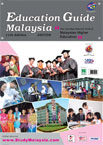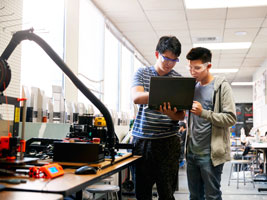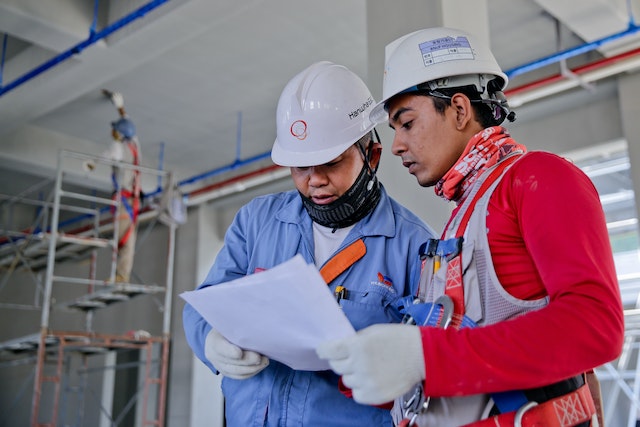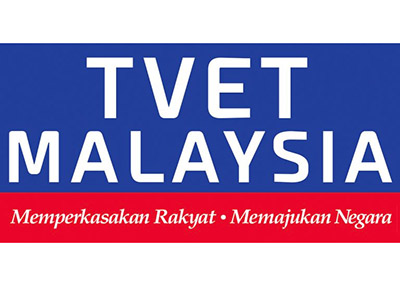
The Ministry of Education
Technical Vocational Schools at Secondary School Level (Form 4 and Form 5)
Technical and vocational education under the Ministry of Education begins at the primary school level. At the primary level, students are introduced to the study of pre-vocational subjects that cover various aspects of manipulative skills. As the students progress into the lower secondary level, pre-vocational education is continued through a Living Skills subject, which provides students further exposure to various areas of simple vocational skills. The upper secondary level (Form 4 and Form 5) is the level where technical and vocational education formally commences, as mentioned earlier. Here, the technical and vocational schools offer the same core subjects as normal academic schools. These cover several core subjects for the languages, mathematics, and sciences but in addition the students are required to take selected technical and vocational subjects from a group of several different options.
- Streams / Types
Secondary Technical Vocational School has 3 streams for selection:- Technical Stream (mechanical, civil and electrical engineering, agriculture science & commerce subjects)
- Vocational Stream (Engineering Trades, Commerce, Home Economics and Agriculture)
- Skill Training Stream (Occupational courses)
- Student Enrolment
Currently there are 89 schools in operation with student enrolments as shown below: (as at June 2003)- Technical stream : 35,349 students
- Vocational stream : 26,806 students
- Skill Training stream : 4,794 students
- Entry Requirements and SPM Examination
The general entry requirement is the Lower Secondary Assessment (PMR) certificate and the school fee is RM35 per year, for a duration of 2 years (Form 4 and Form 5). Upon completing 2 years of studies at this level, the technical or vocational school students are required to sit for the common public examination called the Malaysia Certificate of Education or Sijil Pelajaran Malaysia (SPM) examination similar to those academic school students from the secondary academic schools. However students from the Skill Training stream will sit for Sijil Kemahiran Malaysia* (Malaysian Skill Certificate) after which a government skill qualification is awarded for Level 1, 2, 3, 4 & 5.
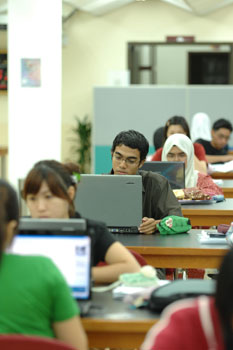
The Ministry of Higher Education
Technical and Vocational Education at Post Secondary Level
This post-secondary level of technical education, which is under the jurisdiction of the Ministry of Higher Education, comprises the following public institutions:
- Polytechnics
- Community Colleges
- Technical University Colleges
- Public Universities
(i) Polytechnics
- Introduction
There are currently 19 polytechnics in the country conducting technical and vocational education offering 37 diploma and 26 certificate programmes covering study areas like engineering, commerce, food technology, marine, hospitality and Design. As at September 2003, there is a total student enrolment of 50,232 where 23,937 of them are undergoing course at the certificate level while the remaining 26,295 are studying at the diploma level.
The primary objective for the establishment of polytechnics is to provide broad-based education and training to upper secondary school leavers to become skilled personnel in the various engineering fields, commercial and service sectors, and upon graduation to become qualified technicians, technical assistants (assistant engineers), technologist and technicians at the semi-professional level as well as at the junior and middle executive levels.
- Duration and Fee
All study programmes are conducted full-time at Certificate and Diploma levels. The duration for all certificate courses is 2 years (4 semesters), while the duration taken for all diploma courses is 3 years (6 semesters) with the exception of Diploma in Shipping (7 semesters) and Diploma in Secretarial Science (4 semesters). The course fees for both the Certificate and Diploma levels are about RM200 per semester.
- General Entry Requirements
- For Certificate Courses:
- Must be a Malaysian citizen
- Must pass the SPM or the SPM (Vocational) examination - For Diploma Courses:
- Must be a Malaysian citizen
- Must possess the Polytechnic Certificate which is relevant to the course applied for
- For Certificate Courses:
- Course Directory
The courses offered by Polytechnics at Certificate and Diploma levels can be summarised as belows:
a. Certificate Level
b. Diploma Level
- More Information
Kindly refer to the Course Directory Section and Application Procedures for Public Higher Learning Institutions Section for course details and a list of polytechnics.
(ii) Community Colleges
- Introduction
Community Colleges were first established by the government in the year 2000 with the primary objective of providing alternative skill training and education for secondary school leavers and those who have left the formal education system. The first intake of students by 12 community colleges for the academic session 2000/2001 was 1255.
Currently there are 34 community colleges in the country with an enrolment of about 6,000 students. It was proposed to have a community college in every parliamentary district to offer flexible training and retraining programmes as needed by the market as well as the local community.
- Duration and Entry Requirements
These colleges conduct technical & vocational education at the Certificate and Diploma levels, for school leavers who have previously had at least 11 years of schooling and obtained the Malaysian Certificate of Education (Sijil Pelajaran Malaysia).
The minimum duration of studies for a Certificate course is 4 semesters while the maximum duration is 10 semesters. The Diploma course, that usually takes 2 semesters, is offered to students who have successfully completed their certificate course with good grades.
- Course Offered
The courses offered are in areas of agriculture; building; business; electrical engineering; health science hospitality & tourism; human development; vehicles; performing arts/visual; and information & communication technology. In addition, short courses are also available in 12 notable areas of computer; electrical; vehicles; industry; apparel; beauty therapy; nutrition; languages; decoration; building; motivation; and generic skills.
- More Information
Kindly refer to the Course Directory Section and Application Procedures for Public Higher Learning Institutions Section for course details and a list of community colleges.
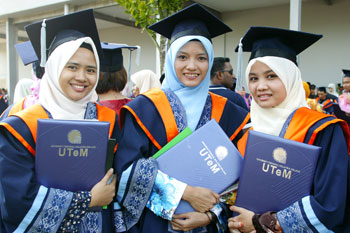 (iii) Technical University Colleges
(iii) Technical University Colleges
- Introduction
In order to upgrade the image and professional level of technical and vocational education due to the increasing importance of employment in the industrial sectors, the government has, since 1999, set up 5 technical university colleges to focus on higher technical education offering engineering and related technical programmes designed to produce graduates with strong theoretical and cognitive knowledge and who possess high competency in application skills. They are:
- Kolej Universiti Sains dan Teknologi Malaysia (KUSTEM) established on 15-7-1999
- Kolej Universiti Teknologi Tun Hussein Onn (KUiTTHO), established in 2000
- Kolej Universiti Teknikal Kebangsaan Malaysia (KUTKM) established on 20-9-2000
- Kolej Universiti Kejuruteraan Utara Malaysia (KUKUM), established in 2002
- Kolej Universiti Kejuruteraan & Teknologi Malaysia (KUKTEM), established in 2002
In March 2006, the Technical University Colleges Network (TUCN) was formed and comprised four of the university colleges, namely, KUiTTHO, KUTKM, KUKTEM and KUKUM. In February 2007, all four university colleges underwent a rebranding initiative and emerged as full universities. The universities are: Universiti Tun Hussein Onn Malaysia (UTHM), Universiti Teknikal Malaysia Melaka (UTeM), Universiti Malaysia Pahang (UMP) and Universiti Malaysia Perlis (UniMAP). TUCN was subsequently rebranded to MTUN (or Malaysian Technical University Network) before being redefined as MTU (Malaysian Technical University) in 2015, in line with its aspiration towards a consortium.
The mission of MTU is to educate, train and prepare highly skilled human resources who are capable of contributing towards the country’s vision of a world class industrial nation. MTU is industry driven and aims to complement existing higher education institutions. The education system at MTU is “Practical Oriented” and focuses towards “Problem Centred Teaching, Action & Experiential Learning”.
- Entry Requirements and Application to Study
For Diploma level programmes, the general entry requirement is SPM/equivalent or certificate from Polytechnics while for Bachelor degree level programmes, it is STPM or Matriculation qualification of the Ministry of Education or Diploma qualification from Polytechnics.
All application to study in the above universities is centrally processed by The Division of Student Admission (Bahagian Pengurusan Kemasukan Pelajar or BPKP) of the Ministry of Higher Education.
- More Information
For more details on application procedures and courses offered, kindly refer to the course directory section and application procedures for Public Higher Learning Institutions Section.
(iv) Public Universities
There are currently a total of 20 public universities in the country, many of which offer technical and technological as well as engineering programmes leading to diploma and degree qualifications. The total student enrolment as at academic session 2003/2004 was 282,560.
- Entry Requirements and Application to Study
For Diploma level programmes, the general entry requirement is SPM/equivalent or certificate from Polytechnics while for Bachelor degree level programmes, it is STPM or Matriculation qualification of the Ministry of Education or Diploma qualification from Polytechnics.
All application to study in the above universities is centrally processed by The Division of Student Admission (Bahagian Pengurusan Kemasukan Pelajar or BPKP) of the Ministry of Higher Education.
- More Information
For more details on application procedures and courses offered, kindly refer to the course director section and application procedures for Public Higher Learning Institutions Section.
- Other Providers
In the meantime, as for technician/sub-professional and craft-level courses, the government training agencies which are involved in conducting training for student trainees include the Ministry of Human Resources. These agencies carry out the programmes through Industrial Training Institutes (ITIs), MARA, under the Ministry of Entrepreneur Development, through the Skills Training Institutes, the Ministry of Youth & Sports through Youth Training Centres, and the Ministry of Welfare Services through its Training Centres. In addition, training is also conducted by the Ministry of Agriculture to produce Junior Agricultural Assistants at the Agricultural Institute. Mention must also be made of the training conducted by the Standards and Industrial Research Institute of Malaysia (SIRIM) in various specialised fields for the public and private sectors, as well as training by the National Productivity Centre for the public and private sectors in areas of management and administration.
The Ministry of Human Resources
The Ministry of Human Resources (MOHR), through its Manpower Department, is one of the major providers of skill training programmes ranging from craft skill level to advanced technical skill level in the country. The skill training programmes of the Manpower Department are conducted through the following Government institutes:- Industrial Training Institutes (ITI), offering craft/vocational to technician courses
- The Centre for Instructor and Advanced Skill Training (CIAST), producing highly vocational skilled instructor
- The Japan-Malaysia Technical Institute (JMIT), offering advanced technology courses
- Advanced Technological Training Centres (ADTEC), offering advanced vocational courses
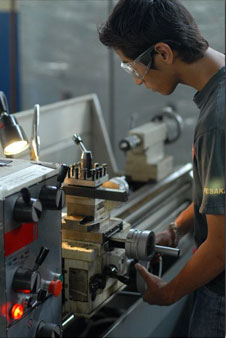 Intakes are usually conducted in January and July. Advertisements would be placed in all major newspapers in March and September. For further enquiries, please forward them to:
Intakes are usually conducted in January and July. Advertisements would be placed in all major newspapers in March and September. For further enquiries, please forward them to:
Manpower Department
Ministry of Human Resources
Aras 6, Blok D4, Parcel D
Pusat Pentadbiran Kerajaan Persekutuan
62502 Putrajaya
Wilayah Persekutuan
Tel: 03 - 8886 5000
Fax: 03 - 8889 2381
1. Industrial Training Institutes (ITI)
- Introduction
Industrial Training Institutes, otherwise known as ITI, provide formal skill training for school leavers and industrial workers to enable them to acquire skills in specialised fields as well as to upgrade the skills of industrial workers to enable them to contribute effectively towards the national development. The student capacity per year is about 10,000.
- List of Industrial Training Institutes (ITI)
The first ITI was established in Kuala Lumpur in the year 1964. At present, there are 14 ITI throughout the country offering Sijil Kemahiran Malaysia (SKM) certificates awarded by MLVK (Majlis Latihan Vokasional Kebangsaan), the national skill qualification awarding body, to the school leavers and industrial workers. They are listed below:
1. ITI Kuala Lumpur
2. ITI Pasir Gudang, Johor
3. ITI Kuala Terengganu, Terengganu
4. ITI Labuan, WP Labuan
5. ITI Bukit Katil, Melaka
6. ITI Kuantan, Pahang
7. ITI Kota Bharu, Kelantan
8. ITI Jitra, Kedah
9. ITI Ipoh, Perak
10. ITI Muar, Johor
11. ITI Pedas, N.Sembilan
12. ITI Kangar, Perlis
13. ITI Kota Kinabalu, Sabah
14. ITI Kota Samarahan, Sarawak
- Course Fee
The training programmes at certificate level will be conducted free of charge, with food and accommodation provided (except for students who are sponsored by corporations or State Foundation where the corporations have to pay between RM2,000 to RM3,000 per sponsored student). However, training at Diploma level is no longer free of charge.
- Entry Requirements
- Malaysian citizens aged below 26 years
- Must pass SPM/SPM(V). Those with good grades in mathematics and science subjects will have an added advantage to be accepted.
- Duration of Study
The duration of study is between 6 to 36 months depending on the types of course
- Application Form
The intake of full time student is once a year and usually in the month of July. Information about the application to study will be made available through advertisements to be placed in the major newspapers in the month of March and April. The application form will usually be made available in all major post-offices. For more information, please contact the respective institute or the Ministry at:
Manpower Department
Ministry of Human Resources
Aras 6, Blok D4, Parcel D
Pusat Pentadbiran Kerajaan Persekutuan
62502 Putrajaya
Wilayah Persekutuan
Tel: 03-8886 5000
Fax: 03-8889 2381
- Qualification Awarded
Depending on the course of study, upon successful completion of the course, the students will be awarded the:
- Sijil Juruteknik Perindustrian
- Sijil Kemahiran Kebangsaan Jabatan Tenaga
- Sijil Kemahiran Malaysia (MLVK)
2. The Japan-Malaysia Technical Institute (JMTi)
- Introduction
The Japan-Malaysia Technical Institute, otherwise called JMTi, was established in 1993 as a cooperation project between the governments of Malaysia and Japan. The main objective pertaining to the establishment of JMTi is to produce skilled industrial technologists in the fields of advanced technology in manufacturing, electronics, computer and mechatronics so as to meet the needs of industrial technological development. Student capacity per year is about 600.
- Courses Offered
The engineering technology courses at Diploma level being offered at JMTi.
- Course Fee
• The annual study fee is RM3,000 with another RM2,000 for accommodation and food.
- Entry Requirements
- Malaysian citizens aged between 18 to 26 years
- Must pass the SPM/MCE/SPM(V) examination with at least Credits in Bahasa Melayu, Mathematics/Add. Mathematics and Science/Physics as well as pass the English Language and one other subject, or
- Possess a Malaysian Skill Certificate (Sijil Kemahiran Malaysia-SKM) Level II Certificate in the related field.
- Duration of Study
36 months of study
- More information
Japan- Malaysia Technical Institute (JMTi)
Plot 59, Lorong Perindustrian Bukit Minyak 15
Kawasan Perindustrian Bukit Minyak
14100 Simpang Ampat, Seberang Perai
Pulau Pinang
Tel: 04-508 7800
Fax: 04-508 7808/9
3. Advanced Technological Training Centres (ADTEC)
- Introduction
The Advanced Technology Centre or ADTEC was established to provide training opportunities at the pre and post employment levels as well as to produce skilled manpower in the area of advanced technology. The first ADTEC centre was set up in the year 1998.
- List of ADTEC and Courses Offered
Currently, there are four ADTEC centres, namely
- ADTEC Kulim, Kedah;
- ADTEC Batu Pahat, Johor;
- ADTEC Shah Alam, Selangor and
- ADTEC Taboh Naning, Melaka.
These 4 institutes offer Diploma in Engineering Technology for school leavers in order to fulfil the needs for skilled labour. These institutes provide advanced vocational training that meets the latest developments in industrial technology. Student capacity per year is about 3,500. The Table 5.4 displayed below indicates a list of courses being offered at ADTEC
- Course Fee
The study fee is RM3,000.00 per year while another RM2,000 is for accommodation and food purposes
- Entry Requirements
- Malaysian citizens aged between 18 to 26 years.
- Must pass SPM/MCE/SPM(V) with Credits in Bahasa Melayu, Mathematics and Science and a pass in the English language, or
- Possess a Malaysian Skill Certificate (Sijil Kemahiran Malaysia-SKM) Level II Certificate in the related field.
- Duration of Study
- 3 years of study for those who possess entry qualification 2
- 2 years of study for those who possess entry qualification 3
- More information
Manpower Department
Ministry of Human Resources
Aras 6, Blok D4, Parcel D
Pusat Pentadbiran Kerajaan Persekutuan
62502 Putrajaya
Wilayah Persekutuan
Tel: 03-8886 5000
Fax: 03-8889 2381
4. The Centre for Instructor and Advanced Skill Training (CIAST)
- Introduction
The Centre for instructors and Advanced Skills Training (or CIAST in short) located at Shah Alam, is responsible for providing training to produce highly skilled instructors for vocational training institutions as well as provide supervisory and advanced skills training so as to upgrade the existing pool of skilled instructors in both the public and private training institutions.
With the establishment of the Department of Vocational Training Research and Development (DVTRD) and the National Instructor Training Programme (NITP), the role of CIAST as a major player in the area of human resource development for instructors in the country would be highly enhanced.
CIAST has a student capacity of about 600 per year. Qualifications awarded are:- Diploma Pengajar Vokasional
- National Instructor Training Programme (NITP)
- Course Fee
The training is free of charge (food and accommodation are provided)
- Entry Requirements
- Malaysian citizens aged between 18 to 26 years
- Must pass the SPM/MCE/SPMV, with Credits in Malay Language, Mathematics/Add. Mathematics, Science/Physics and a pass in English Language and another subject
- Must pass the SPM/MCE/SPMV, with Credits in Malay Language, Mathematics/Add. Mathematics, Science/Physics and a pass in English Language and Malaysian Skill Certificate (Sijil Kemahiran Malaysia-SKM) Level II in the related field.
- Duration of Study
- 3 years of study for those who meet entry requirement 2
- 2 years of study for those who meet entry requirement 3
- More information
The Centre for instructors and
Advanced Skills Training (CIAST)
Jalan Petani 19/1
Peti Surat 7012, Seksyen 19
40900 Shah Alam
Selangor Darul Ehsan
Tel: 03-5541 5736 / 5541 5739
Fax: 03-5541 4807

The Ministry of Youth & Sports
Introduction
The Ministry of Youth & Sports is another important provider of skill training to the youths of ages 17 to 25. The Ministry’s efforts to mould and produce skilled individuals in various skills areas/fields are in line with the National Youth Development Policy that can subsequently contribute to the national industrial sector of having semi-skilled and skilled workers.
By providing skill trainings through its Skill Department, the role of the Ministry of Youth & Sports is to train as many youths as possible in various fields through the various approaches, such as short and long term training as well as institutionalized and non-institutionalized training.
(i) Institutionalized Training - IKBN
Institutionalized training can be defined as part-time skills training which is conducted at Institut Kemahiran Belia Negara (IKBN) located throughout the country. There are various skills areas being offered, such as Mechanical, Automotive, Electric, Electronic, Civil Engineering, Hospitality, Textile & Apparel and Personnel Services based on the accreditation system of Sijil Kemahiran Malaysia (SKM) and Jabatan Bekalan Elektrik dan Gas (JBE & G).National Youth Training Institutes (IKBN)
- Introduction
The National Youth Skill Training Institutes (Institut Kemahiran Belia Negara, IKBN) were established by the Ministry of Youth and Sports in the year 1996, with its original intention of reducing unemployment rate among school dropouts and enabling them to acquire jobs. Thereafter its training programmes were expanded towards human resource development by training as many youths as possible in the field of technical skills so as to produce skilled workers to meet the needs of the industrial sector.
- List of IKBNs
Currently there are 14 IKBN and one IKTBN (providing advanced skill training programmes) under the Skill Department of the Ministry of Youth & Sports :
1. IKBN Wakaf Tapai, Terengganu
2. IKBN Dusun Tua, Selangor
3. IKTBN Sepang, Selangor
4. IKBN Peretak, Selangor
5. IKBN Seri Iskandar, Perak
6. IKBN Jitra, Kedah
7. IKBN Kuala Perlis, Perlis
8. IKBN Seberang Prai, Pulau Pinang
9. IKBN Chembong, Negri Sembilan
10. IKBN Alor Gajah, Melaka
11. IKBN Pagoh, Johor
12. IKBN Bachok, Kelantan
13. IKBN Miri, Sarawak
14. IKBN Kinarut, Sabah
15. IKBN Pontian , Johor (in cooperation with KOBENA Sdn Bhd)
Five of the aforementioned IKBNs will be turned into Centres of Excellence that focus on one of the following fields of specialisation:- IKBN Seberang Perai - Electric and Electronic
- IKBN Chembong - Automotive
- IKBN Alor Gajah - Hospitality
- IKBN Pagoh - Mechanical
- IKBN Bachok - Civil Engineering
- Entry Requirements
The minimum qualifications are:- Should be a Malaysian citizen aged between 17-24
- Should have completed Form 5
- Should pass the SPM examination with passes in Bahasa Melayu, Mathematics/Science/Physics/Chemistry.
- Should possess SKM 1 and SKM 2 qualification for those who want to pursue SKM 3 and Diploma in Technology
Candidates should be Malaysian citizens aged between 17-24 years and should not have undertaken any training from any institutes. In addition, candidates must also be single, in good health condition with no physical disabilities, have never been involved in any criminal activities, and are willing to undergo training until completion of the programme.
- How to Apply
There are 2 intakes every year (January & July). Advertisements will be placed in the major newspapers in March and August. For further details, please contact the respective State Youth & Sports Departments or the Ministry of Youth & Sports at:
Ketua Setiausaha
Skills Development Division
Ministry of Youth and Sports
Tingkat 2, Blok G, Jalan Dato’ Onn,
50570 Kuala Lumpur
Tel: 03 - 2690 8421 / 2690 8355
Fax : 03-2693 2231
(ii) Non-Institutionalized Training - IKBN
The Skill Department also offers non-institutionalized training which can be described as short-term modular skills training which are carried out flexibly in terms of the time duration, approach, and premises. Some of the non-institutionalized skills training conducted include Short-Term and Modular Courses in IKBN, National Youth Apprenticeship Scheme, On-The-Job Training, and Light Skills Training at the Youth and Sports State Complex.National Youth Apprenticeship Scheme
- Introduction
The National Youth Apprenticeship Scheme is a form of training that involves the cooperation between the private and government sectors. Through this scheme, the Employer sponsors apprentices and provides On-The-Job Training while the Government provides advisory service and incentives.
- Targeted Groups
The scheme is aimed at school leavers with PMR, SPM or STPM, who are unemployed, unskilled and unable to further their education at any formal educational institutions. It is also aimed at those working in the private sector interested in acquiring a skill or upgrading their existing skills.
- Training Programme and Duration
The scheme emphasizes practical training and exposure to the skills field. The practical training is conducted at factories, buildings or training centres owned by the private sector. The training is conducted in stages in each district of a state, as according to the skills area required by the industry.
Some of the fields are as follows:- Electrical & Electronic Engineering
- Mechanical & Production Engineering
- Civil Engineering
- Automotive
- IT & Telecommunications
- Services - Textiles & Apparel, Banking & Finance, Hotel Industry, Computer etc.
The duration of training is between 6 - 12 months as determined by the Employer and the Ministry according to the field and course level.
- Entry Requirements
Candidates should be sponsored by employers and be between 16 - 25 years old, with academic qualifications relevant to the training programme and skill field.
This scheme is at present conducting a programme called the Hotel Industry Apprenticeship Scheme Programme (HIAS), which is established by the collaboration of the Ministry of Youth and Sports, the Human Resource Development Berhad, and private colleges. Among the colleges involved in this programme scheme are Taylor’s College School of Hotel Management, Sunway College Sdn Bhd, KDU College Sdn Bhd, and the Legend College School of Hospitality and Tourism.
The course areas offered under this programme are housekeeping, guest reception techniques, food & beverage service, and food preparation practice. Applicants who wish to apply and enrol in this programme can come straight to the participating college concerned for a “walk-in interview” with the sponsoring hotel, or directly apply with the Ministry of Youth & Sports by filling in the relevant forms. In addition, colleges involved in this scheme will also be posting up advertisements in major newspapers.
A monthly allowance of RM300 - RM450 a month will be given to trainees. The Ministry of Youth & Sports will contribute RM210 while the remaining sum will be contributed by the sponsoring hotel.
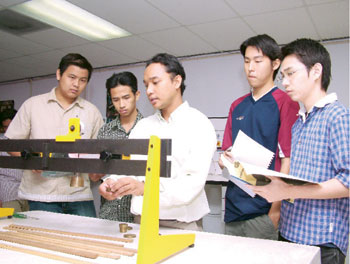
The Ministry of Entrepreneur Development & Cooperative
Courses/Workshops Offered by Ministry of Entrepreneur Development & Cooperative
The Ministry of Entrepreneur Development & Cooperative organises courses and workshops for entrepreneurs and potential entrepreneurs in the following categories:
- Entrepreneurship programmes for Government servants who plan to leave Government sectors to venture full-time into business:
- Basic Business Training
- Training and Motivation Scheme for Government Servants for venturing Into Business (Support Groups and Non-Graduate Teachers)
- Entrepreneur Training
- Some Entrepreneurship Programmes for Entrepreneurs or Potential Entrepreneurs being offered are:
- Basic Entrepreneur Training
- Successful Entrepreneur Programme
- Graduate Entrepreneurship Basic Training
- Export Development Programme
- Strategic Marketing Workshop
- Strategic Financial Management Workshop
- E-Commerce Workshop: Business Opportunities in E-Commerce
- Workshop on Entrepreneurship
- Workshop on Preparation of Business Plan
- Workshop on Introduction to 5S
- Workshop on Introduction to New Technology
- Workshop on Import and Export
- Introduction to Globalisation
- Training Packages, covering the various fields
For further enquiries, please contact:
Ministry of Entrepreneur
Development & Cooperative
Entrepreneur Training Division
Tingkat 25, Bangunan Medan MARA
Jalan Raja Laut
50652 Kuala Lumpur
Tel: 03-2298 5022 ext.248,249
Fax : 03-26924964
The Ministry of Agriculture and Agro-based Industry
List of Agriculture Institutes and Courses Offered
Agricultural Institutes of the Ministry of Agriculture offer Certificate in Agriculture to Sijil Pelajaran Malaysia (SPM) school leavers. This certificate qualification is recognized and is equivalent to a certificate from the Polytechnics. Those who have obtained the Certificate in Agriculture can further their studies at Diploma level at Universiti Putra Malaysia.There are seven (7) Agricultural Institutes throughout the country providing agricultural training to meet the demand of skilled workers both in both the public and private sectors and to provide skills training and specialization to create agricultural entrepreneurs. These institutes are listed as follows:
- Bumbong Lima Agricultural Institute, Pulau Pinang
- Parit Lima Agricultural Institute, Perak
- Serdang Lima Agricultural Institute, Selangor
- Ayer Hitam Lima Agricultural Institute, Johor
- Kuala Lipis Lima Agricultural Institute, Pahang
- Sabah Lima Agricultural Institute, Sabah
- Sarawak Lima Agricultural Institute, Sarawak
The first Agricultural Institute was set up in Serdang (Selangor) in 1957.
- Course Fee & Duration
The course fee per year is RM4040 inclusive of tuition, food, hostel and a subsistence allowance. All students are offered scholarships. The duration of study is 2 years or 4 semesters.
- Application Requirements
- Sijil Pelajaran Malaysia (SPM) or its equivalent with passes in Bahasa Melayu, Mathematics and one other relevant subject
- Aged between 17-25 years (up to 30 years old for government officers)
- Medically fit
- Successful in the interview
- Single
- Scholarships
Successful applicants will be awarded with scholarships.- Training Centres and Facilities
- Hostels and food are provided.
- Application Procedures
Application forms can be obtained from the Agriculture Institutes, State Departments of Agriculture or the Human Resource Department Division at Wisma Tani Kuala Lumpur.
Please forward your applications to:
The Director,
Human Resource Department Division
Department of Agriculture,
Ministry of Agriculture and Agro-based Industry
7th Floor, Wisma Tani,
Jalan Sultan Salahuddin
50632 Kuala Lumpur
Tel : 03-2617 5438
Fax : 03-2691 5051
The Ministry of Health
Introduction
The Training Division of the Ministry of Health manages the training of paramedics and auxiliaries in various disciplines to meet the Ministry’s manpower needs for such personnel. The training courses offered are conducted in 43 of its specialized training colleges operating throughout the country.
Entry Qualifications Required of Applicant
- Applicant must be a Malaysian citizen, aged between 17 - 25 years
- He/she must be medically fit, and also single
- Possess the Sijil Pelajaran Malaysia (SPM) or other equivalent qualifications with a pass in Bahasa Melayu (priority would be given to candidates with credits in English, Mathematics, and Science). For the Dental Surgery Assistant course, the minimum qualification is a pass at the Penilaian Menengah Rendah (PMR) level.
- Successful in the interview conducted
Scholarships Offered
Successful applicants who have been accepted into the training programmes will be awarded with scholarships by the Ministry of Health, which cover course fees and monthly allowances. Apart from scholarships, hostel accommodation and uniform are also being provided for the candidates.
Application Procedures
There are two (2) intakes into the training programmes in a year - in January and July. Application forms can be obtained from any of the following:
- Suruhanjaya Perkhidmatan Awam Malaysia
Aras 6 - 10, Blok C7, Parcel C,
Pusat Pentadbiran Kerajaan Persekutuan
82520 Putrajaya
- Suruhanjaya Perkhidmatan Awam Malaysia
Pusat Temu Duga, Jalan Cenderasari
50520 Kuala Lumpur
- Suruhanjaya Perkhidmatan Awam Malaysia
Urus Setia Cawangan Sabah
Tingkat 6, Blok E, Bangunan KWSP,
Jalan Karamusing,
88100 Kota Kinabalu, Sabah
- Suruhanjaya Perkhidmatan Awam Malaysia
Urus Setia Cawangan Sarawak
Tingkat 10, Bangunan Sultan Iskandar
Jalan Simpang Tiga, 93520 Kuching, Sarawak
- The Suruhanjaya Perkhidmatan Awam in all the states in West Malaysia
- All Jabatan Tenaga Manusia Negeri/Daerah
- Alternatively, application forms can also be downloaded from the Suruhanjaya Perkhidmatan Awam.
For further enquiries, please contact:
The Training Division
Ministry of Health Malaysia
Tingkat 18, Bangunan PERKIM
Jalan Ipoh, 51200 Kuala Lumpur
Tel: 03-4045 7001 Fax: 03-4045 4846
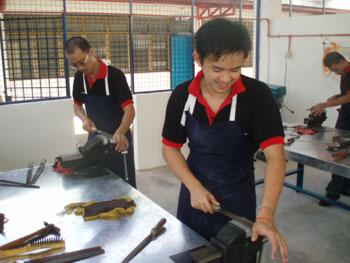
Majlis Amanah Rakyat (MARA)
The Majlis Amanah Rakyat (MARA), through its ‘Program Latihan Kemahiran MARA’, offers various commercial and skill training programmes. These programmes aim at increasing the number of highly trained Bumiputra youth in the fields of business, industry, manufacturing, high technology and entrepreneurship.Bahagian Kemahiran MARA, one of the units under the MARA Education Sector, is responsible for the management of the ‘Program Latihan Kemahiran MARA’ as well as serving as the coordinator in administering the MARA institutes namely Institut Kemahiran MARA (IKM)/Kolej Kemahiran Tinggi MARA (KKTM).
For further enquiries, please contact:
Bahagian Kemahiran MARA
Majlis Amanah Rakyat (MARA)
Tingkat 20 & 21, Ibu Pejabat MARA,
21, Jalan Raja Laut, 50600 Kuala Lumpur
Tel: 03 - 2691 5111 Fax: 03 - 2691 4510
I. Institute Kemahiran MARA (MARA Skills Training Institutes)
- Introduction
MARA Skills Training Institutes (Institut Kemahiran MARA, IKM) were first established in the year 1968 to conduct training for Bumiputera candidates in various technical fields and offer qualifications in business and industry. From the year 1968 to 2003, there was a total enrolment of 80,954 trainees. In 2003, the intake to IKM was 10,037 trainees.
There are a total of 14 IKM located throughout the country offering Certificate and Diploma level programmes. However, the status of 3 out of the 14 IKM has been upgraded to college level offering higher end technological programmes and they are known as Kolej Kemahiran Tinggi MARA (KKTM).
- List of IKM / KKTM
The 11 IKM are :
1. IKM Jasin (Melaka)
2. IKM Johor Bahru (Johor)
3. IKM Alor Setar, (Kedah)
4. IKM Sg. Petani (Kedah)
5. IKM Lumut (Perak)
6. IKM Kuala Lumpur 7. IKM Beseri (Perlis)
8. IKM Besut (Terengganu)
9. IKM Pekan (Pahang)
10. IKM Kuching (Sarawak) and
11. IKM Kota Kinabalu (Sabah).The 3 KKTM are :
1. KKTM Petaling Jaya (Selangor)
2. KKTM Balik Pulau (Penang)
3. KKTM Pasir Mas (Kelantan)
- Training Programmes
The training structure consists of theoretical learning as well as the acquirement of practical competency/efficiency to ensure the quality of each trainee
- Full-Time Programmes at Institutes
- Certificate Level
Full-time skill training at Certificate level is conducted at IKMs in Jasin (Melaka), Johor Bahru (Johor), Alor Setar, (Kedah), Sg. Petani (Kedah), IKM Lumut (Perak), IKM Kuala Lumpur, IKM Beseri (Perlis), Besut (Terengganu), Pekan (Pahang), Kuching (Sarawak) dan Kota Kinabalu (Sabah).
There are 29 full-time courses available and each IKM offers between 4 - 16 courses. Eligibility for a course is subject to the minimum entry requirements specified for each course. The duration of training is 18 months - 24 months.
- Diploma Level
Full-time skill training at Diploma level is conducted at KKTM Pasir Mas (Kelantan), KKTM Balik Pulau (Pulau Pinang), IKM Kuala Lumpur, KKTM Petaling Jaya (Selangor), IKM Jasin (Melaka) and IKM Johor Bahru (Johor).
(* indicates that these IKMs have been upgraded to Kolej Kemahiran Tinggi MARA)
There are 9 full-time courses available and each IKM offers between 1 - 5 courses. Eligibility for a course is subject to minimum entry requirements specified for each course. The duration of training is 36 months (6 semesters).
- Certificate Level
- Fields of Training Courses
The skills training programmes at MARA are offered in fields such as Automotive Engineering, Civil Engineering, Electrical Engineering, Electronic Engineering, Mechanical Engineering, Manufacturing Technology, Tool & Die Technology, and Product Design.
- How to Apply
There are 2 intakes each year. Applications are announced through newspaper advertisements in September for the January intake and in March for the July intake.
- Application Procedure
Application forms can be obtained from the MARA Skill Training Department (Bahagian Kemahiran MARA)/MARA Skill Training Institutes/ MARA State and District Offices.
II. MARA Business Institutes
Commercial professional qualifications are offered by 8 MARA Business Institutes and MARA Infotech Academy.Full time courses at certificate, diploma and higher diploma level for SPM school leavers are conducted at the MARA Business Institutes in Beranang and Melaka as well as at the MARA Infotech Academy.
The short term courses are also conducted at the MARA Infotech Academy and the MARA Business Institutes in Melaka, Kuantan, Ipoh, Alor Setar, Kota Bharu, Batu Pahat and Langkawi.
III. MARA Advanced Skills Training Institutes
These institutes were established as joint venture projects with specific international training agencies in a bid to get technical expertise in high technology skills.The 4 MARA Advanced Skills Training Institutes are:
- German-Malaysian Institute (GMI)
- British-Malaysian Institute (BMI)
- Malaysia France Institute (MFI)
- Malaysia Spanish Institute (MSI)
- Malaysian Institute of Aviation Technology (MIAT)
These Institutes offer diploma courses for graduates of MARA Skills Training Institutes and SPM school leavers, and in the year 2002, they (except GMI) have already been absorbed into the newly established university called Universiti Kuala Lumpur (UniKL) which is managed by Universiti Teknikal MARA Sdn Bhd, a wholly-owned subsidiary of MARA.
















